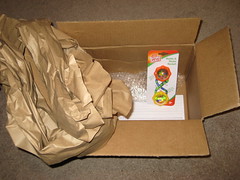
Recycle Bank and Burts Bees sent me a list of 10 Earth Day tips to use on this site. They're great tips, but as I was reading them over I realized (even before I got to their ending comment) - these are all things you can do any day, not just on Earth Day.
As Earth Day approaches, I'll be talking more about what you can do in your own community to celebrate, but I thought this list was worth putting up because they are things we should be doing whether it's Earth Day or not. Here's what Recycle Bank and Burts Bees have to say.
RecycleBank and Burt’s Bees have come up with 10 easy ways that you can do to make a difference today, tomorrow, and every day.
- Recycle: This Earth Day, take a good hard look at your trash. We trust you’ll fish out some recyclables in the mix (probably from others), but also remember E-Waste like cell phones, MP3’s and laptops can all be recycled and repurposed.
- Freecycle: The above is sure to stir up some goodies that can be useful to those around us: clothes, books, electronics, furniture, etc.
- Reuse. Reuse. And did we mention Reuse? Products have life spans. Leave behind paper plates, plastic forks and any other disposables. Reusable serve ware, portable mugs for that latte and a water jug for that necessary potable will lessen landfills and just make life taste better!
- Wallet Activism: Look for products made from recycled materials, natural ingredients and minimal / biodegradable packaging. By supporting eco-friendly companies your green supports the greater green.
- Park It: Celebrate the beauty of spring with a walk when you could have driven. Carpool, take public transport, ride your bike. If you can’t do it every day, try once a week. When you do drive, make sure you pump up your tires so you can deflate your fill-ups.
- Junk It: Putting the kibosh on junk mail and catalogues will save you time, save landfill space and save millions of trees (and probably make the post office happy too).
- Bills. Bills. Bills. We won’t advise not paying ‘em, but we wholly support going paperless for your banking, bill paying and at the ATM.
- Live Life Locally: Support your local farmers while enjoying fresh produce and organically grown goodies. You can even try going veggie once or twice a week.
- Say Y-E-S to CFL’s: You’ll save time, money and energy…but you may have to give up on the “How many _____’s does it take to change a light bulb?” jokes because you’ll change them so infrequently.
- Spread the Word: Tell your friends how easy it is to shave off some carbon here, save some resources there and conserve a little energy here. And then they can tell their friends. And then they can tell their friends…
RecycleBank and Burt’s Bees are committed to finding clean, green ways of existing on this planet. These simple steps above can help you protect the environment, each and every day.
Image: Earthday.net




